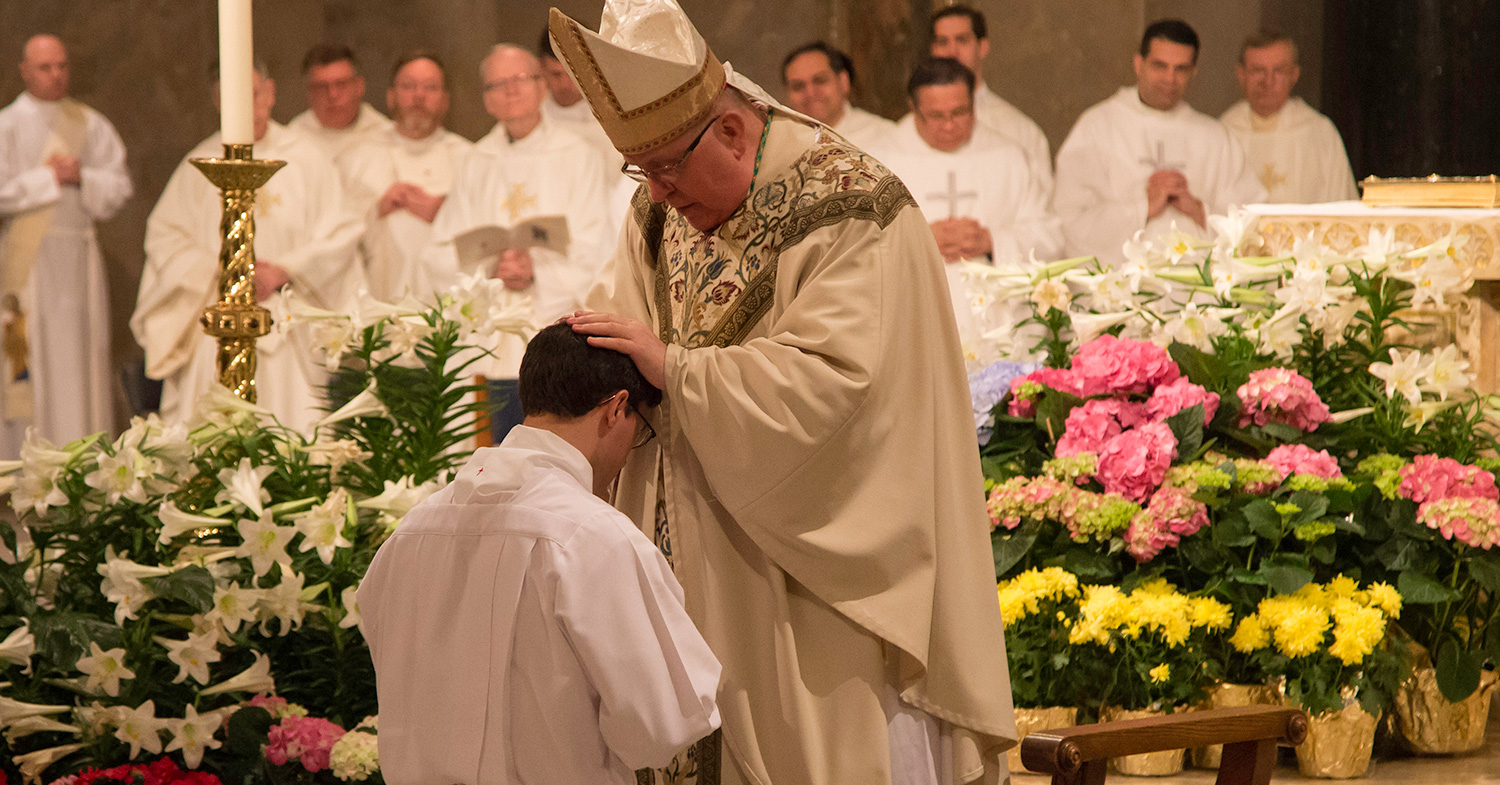
“When the priest’s identity as configured to Christ culminates in his ministry on behalf of Christ, which is called
“amoris officium” (a work of love), he finds his unity of life in pastoral charity. Presyterorum ordinis, no. 14, says: ‘Priests will
achieve the unity of their lives by joining themselves with Christ in the recognition of the Father’s will and in the gift of themselves
to the flock entrusted to them. In this way, by adopting the role of the good shepherd they will find in the practice of pastoral
charity itself the bond of priestly perfection which will reduce to unity their life and activity.’”
– Program of Priestly Formation, §25
THEOLOGY PROGRAM
In a four-year program of preparation, the Church distinguishes four necessary dimensions of formation: human, spiritual, intellectual and pastoral. Yet, as Pastores Dabo Vobis underscores, these dimensions are facets of a single program of priestly formation, leading to the goal of ordained priestly ministry in the Church. In addition, some seminarians may return to Theological College after ordination for the “five-year option” to earn their S.T.L. (or a “six-year option” J.C.L.) degree from The Catholic University of America’s School of Theology and Religious Studies.
Theological College’s approach is distinctive in the following ways:
Spiritual and Human Formation
As grace builds on nature so spiritual formation is inseparable from human formation. Spiritual formation at Theological College blends an emphasis on community life with an equal emphasis on the individual and personal needs of each seminarian. Daily prayer – Morning Prayer, Eucharist and Evening Prayer – set the tone of the community. The community also meets weekly for conferences on spiritual formation, regularly for days of recollection and yearly for an extended retreat. Eucharistic adoration, devotion to our Lady and regular celebration of the sacrament of Penance play important roles in the life of the seminary.
Human formation centers on two relationships that foster the seminarian’s growth. Each student has both a priest spiritual director (a completely confidential relationship) and a formation advisor (a mentoring relationship). Together, they help each seminarian chart the progress of his spiritual life as well as his personal and pastoral development. These programmatic elements make adult maturity and personal accountability a reality at Theological College. They reflect our deep conviction that the goals of priestly formation can best be met by treating each candidate as a mature and responsible adult.
Intellectual Formation
The School of Theology and Religious Studies of Catholic University boasts a faculty of distinguished scholars and offers both civil and pontifical degrees. Seminarians at Theological College are registered in the School of Theology and Religious Studies, in which they take courses in scripture, systematic theology, moral theology, liturgical studies, spirituality, canon law and pastoral theology. They may also benefit from courses offered by eight other independent schools of theology that form the Washington Theological Union in Washington, D.C. With Catholic University, TC now offers the option of a five-year S.T.B/S.T.L. track for eligible students.
The School of Theology and Religious Studies offers a wide variety of degrees:
– The Master of Divinity degree (M.Div.) is a professional degree for seminarians for whom the pastoral focus of academic formation is especially significant.
– The Master of Arts degree (M.A.) is an advanced degree in Roman Catholic theology for seminarians who wish to pursue a more intense intellectual formation.
– Baccalaureate of Sacred Theology (S.T.B.) is an ecclesiastical degree that provides seminarians with a basic theological orientation in Roman Catholic theology.
– The Licentiate in Sacred Theology (S.T.L.) is an advanced ecclesiastical degree that provides those with an S.T.B. a more methodical and incisive theological knowledge and qualifies the recipient to serve at the Catholic seminary/university level as a teacher and as a consultant for arch/dioceses and other ecclesial entities. Theological College offers hospitality for newly ordained priests returning for this “fifth-year option.”
The School of Theology and Religious Studies at Catholic University also offers a Doctor of Sacred Theology (S.T.D.) degree and a Doctor of Ministry (D.Min.) degree. The doctorate in theology is an advanced ecclesiastical degree; the doctor of ministry is a professional doctorate with a focus on pastoral ministry.
Pastoral Formation
Pastoral formation provides a helpful counterpoint to classroom learning in preparation for a ministry that by its nature is essentially pastoral. Priestly ministry requires a set of pastoral skills – preaching, counseling, the ability to work with small groups, etc.
Theological College uses a graded experiential approach to pastoral formation. Students in First Theology engage in religious education in the context of direct service to the poor. Second Theologians take part in hospital-based ministry, focused on intense learning through a combination of individual supervision and small group interaction. Third and Fourth Theologians participate in parish-based ministry with individual supervision. Homiletics also plays an important role in the formation of every seminarian.
Scholarships
Catholic University and Theological College offer a wide range of partial and full scholarships for academically gifted seminarians including the McShain Scholarships, the St. Vincent Pallotti Scholarships, and individual university scholarships.
Admissions
For admission information, please contact the Office of the Rector at (202) 756-4907, (202) 756-4909 [fax] or [email protected].
